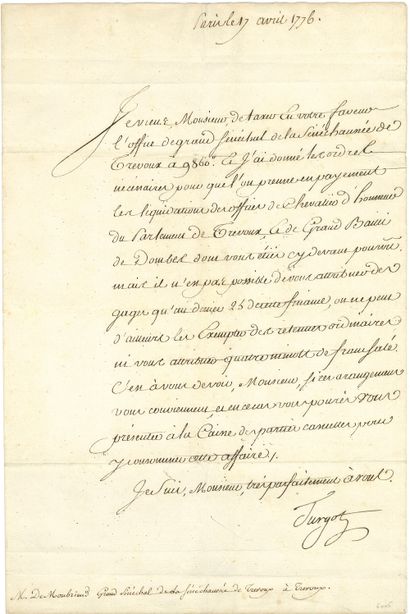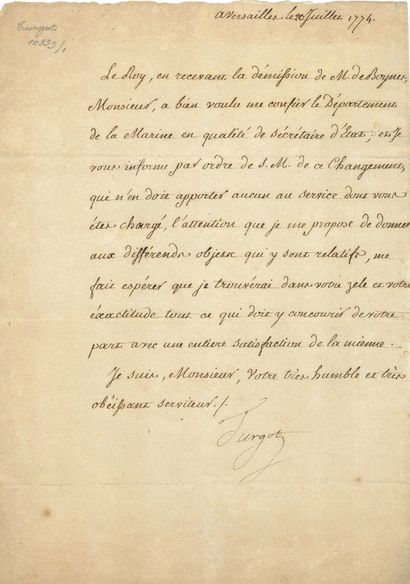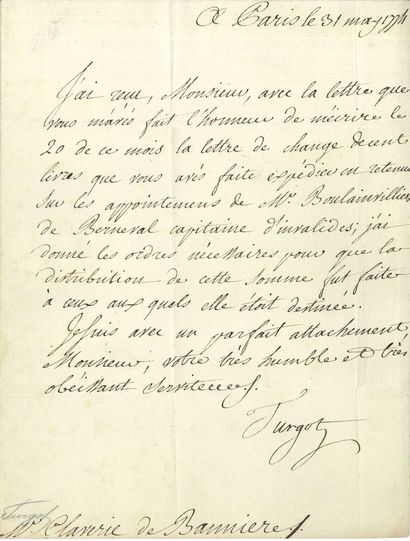Anne Robert Jacques Turgot, Baron de l'Aulne (1727-1781)
28 autograph letters to the Marquis de Condorcet, the majority Limoges or Paris, also Compiegne, Versailles, La Roche Guyon and Tremblai, 6 April 1770 - 15 October [1776]
Together approximately 88 pages, address panels (9), seals. In a modern morocco-backed cloth portfolio. Provenance: with Librairie Auguste Blaizot, Paris, c. 1952(?); Christie's, 29 November 1995, lot 190.
An important series of letters from one of the greatest 18th-century economists and statesmen. The subjects covered include the poverty of Turgot's province, considerable discussion of chemistry and physics, particularly the calcination of metal, the theory of light, gravitation, fluids and the formation of crystals ('Je me souviens pourtant ... d'avoir lu autrefois ... un beau theorem de Neuton d'ou il resulte qu'avec un pouce cube de matiere on peut remplir toute la sphere qui appourray a celui de l'orbite de Saturne'); referring to Scottish experiments with fixed air, and the difficulty of translating the term 'air fixé; or 'air fixe', and welcoming confirmation of Newton's experiments with flintglass; also writing of mathematics and logarithms, and in one letter enclosing a diagram; on astronomy, and asking about the purchase of instruments and a Flamsteed catalogue for an astronomer at Limoges; writing of books and new works, mentioning one by Voltaire, a new article by Priestley, proposals for the Encyclopédie, and referring to his friends such as Morellet, D'Alembert, and most frequently Mademoiselle de l'Espinasse; after his appointment as Minister of the Navy in Paris, referring also to politics, the King and Court, and his attitude to religion, 'Ma proscription contre les devots n'est pas aussi generale que la votre parce que j'en ai vu qui etoient de tres honnetes gens', while continuing to discuss algebra and gravitation.
Turgot's enthusiastic discussion in several long letters (one of 12 pages) of problems of physics and chemistry reflects the remarkable spectrum of his learning. He refers to the past superiority of the English in science, writing à propos of a history of the Academy before 1699, 'il faut avouer qu'a cette epoque nous etions prodigieusement inferieurs dans les sciences aux Anglois, dont c'etoit le bontems, et meme aux Allemans', and discourses on many problems including the concepts of fluidity and mass, 'autre mistere. Supposerées vous l'element ou l'unite insensible semblable ressemble au plus grand. Mais comment l'assemblage de ces petites crystaux en formera t'il un grand semblable a ses elements'; elsewhere he proposes a method of finding a logarithm, frequently shows his belief in Newton's findings, and praises Linnaeus 'Je crois comme vous que vous trouveres dans le bon Linnaeus un grand melange de sagacite et de pedante rien, mais la nature des eloges Academiques est de ne dessiner les heros que de profil'. Returned to Paris, he shows enthusiasm for M. Lavoisier's machine for desalination of sea-water. Throughout, he refers to his literary and intellectual interests, 'Voila tant de bavardage physique qu'il ne me reste gueres de temps pour vous parles d'autre chose, vous ne me donnes fort bonne idee de la response d'Horace; il est mieux en secretaire que Boileau, pas aussi bien cependant que Mlle de l'Espinasse'. From Paris he continues to reflect on scientific matters, ('L'univers tout entier n'est qu'un pendule complique'), and writes of the King and Ministers, the speculation on the departure of Madame du Barry from the capital ('On dit la Borde Chasse'), and in almost every letter of his concern for Mlle. de l'Espinasse's health, and once of his own ('Ma gout, monsieur, ne vaut pas la peine de murmurer contre la providence'), the letters all indicating the warmth of his friendship for Condorcet.
The recipient is Turgot's close friend and biographer, Marie-Jean-Antoine-Nicolas Caritat, Marquis de Condorcet (1743-1794), mathematician and philosopher: together they knew almost all the most distinguished men of their day. Voltaire, who met Turgot in 1760, wrote to D'Alembert that he had scarcely met a man more lovable or better informed, and the present letters reflect an extraordinary breadth of interest and learning, lightened by his humour and generosity.
Turgot had been educated for the Church but turned to economics while still in his youth. His best known work on the creation and distribution of wealth appeared in 1766. He contributed to the Abbé Morellet's Dictionnaire de la Commerce, and is generally accepted as having influenced Adam Smith. In Paris he frequented all the most celebrated salons, and was associated particularly with that of Mademoiselle de l'Espinasse, often mentioned in the letters. In 1761 he was appointed Intendant of Limoges, including some of the poorest and most overtaxed districts of France, and 15 of the letters are written from Limoges, 'Je suis en cesse harcelé de lettres de toutes les parties de la province et encore plus de spectacle de la misere a laquelle tout de travail du monde ne peut remedier'. The remainder are written during visits, or after his appointment as Minister for the Navy in 1774.
Forty-nine letters from Turgot to Condorcet, including the present twenty-eight, were published by Charles Henry in 1882 (Correspondence Inédite de Condorcet et de Turgot), with two hundred letters by Condorcet. The letters by Turgot were then in the collection of Monsieur Minoret which was later dispersed. Those from Condorcet to Turgot are in the Institut de France.
Anne Robert Jacques Turgot, Baron de l'Aulne (1727-1781)
28 autograph letters to the Marquis de Condorcet, the majority Limoges or Paris, also Compiegne, Versailles, La Roche Guyon and Tremblai, 6 April 1770 - 15 October [1776]
Together approximately 88 pages, address panels (9), seals. In a modern morocco-backed cloth portfolio. Provenance: with Librairie Auguste Blaizot, Paris, c. 1952(?); Christie's, 29 November 1995, lot 190.
An important series of letters from one of the greatest 18th-century economists and statesmen. The subjects covered include the poverty of Turgot's province, considerable discussion of chemistry and physics, particularly the calcination of metal, the theory of light, gravitation, fluids and the formation of crystals ('Je me souviens pourtant ... d'avoir lu autrefois ... un beau theorem de Neuton d'ou il resulte qu'avec un pouce cube de matiere on peut remplir toute la sphere qui appourray a celui de l'orbite de Saturne'); referring to Scottish experiments with fixed air, and the difficulty of translating the term 'air fixé; or 'air fixe', and welcoming confirmation of Newton's experiments with flintglass; also writing of mathematics and logarithms, and in one letter enclosing a diagram; on astronomy, and asking about the purchase of instruments and a Flamsteed catalogue for an astronomer at Limoges; writing of books and new works, mentioning one by Voltaire, a new article by Priestley, proposals for the Encyclopédie, and referring to his friends such as Morellet, D'Alembert, and most frequently Mademoiselle de l'Espinasse; after his appointment as Minister of the Navy in Paris, referring also to politics, the King and Court, and his attitude to religion, 'Ma proscription contre les devots n'est pas aussi generale que la votre parce que j'en ai vu qui etoient de tres honnetes gens', while continuing to discuss algebra and gravitation.
Turgot's enthusiastic discussion in several long letters (one of 12 pages) of problems of physics and chemistry reflects the remarkable spectrum of his learning. He refers to the past superiority of the English in science, writing à propos of a history of the Academy before 1699, 'il faut avouer qu'a cette epoque nous etions prodigieusement inferieurs dans les sciences aux Anglois, dont c'etoit le bontems, et meme aux Allemans', and discourses on many problems including the concepts of fluidity and mass, 'autre mistere. Supposerées vous l'element ou l'unite insensible semblable ressemble au plus grand. Mais comment l'assemblage de ces petites crystaux en formera t'il un grand semblable a ses elements'; elsewhere he proposes a method of finding a logarithm, frequently shows his belief in Newton's findings, and praises Linnaeus 'Je crois comme vous que vous trouveres dans le bon Linnaeus un grand melange de sagacite et de pedante rien, mais la nature des eloges Academiques est de ne dessiner les heros que de profil'. Returned to Paris, he shows enthusiasm for M. Lavoisier's machine for desalination of sea-water. Throughout, he refers to his literary and intellectual interests, 'Voila tant de bavardage physique qu'il ne me reste gueres de temps pour vous parles d'autre chose, vous ne me donnes fort bonne idee de la response d'Horace; il est mieux en secretaire que Boileau, pas aussi bien cependant que Mlle de l'Espinasse'. From Paris he continues to reflect on scientific matters, ('L'univers tout entier n'est qu'un pendule complique'), and writes of the King and Ministers, the speculation on the departure of Madame du Barry from the capital ('On dit la Borde Chasse'), and in almost every letter of his concern for Mlle. de l'Espinasse's health, and once of his own ('Ma gout, monsieur, ne vaut pas la peine de murmurer contre la providence'), the letters all indicating the warmth of his friendship for Condorcet.
The recipient is Turgot's close friend and biographer, Marie-Jean-Antoine-Nicolas Caritat, Marquis de Condorcet (1743-1794), mathematician and philosopher: together they knew almost all the most distinguished men of their day. Voltaire, who met Turgot in 1760, wrote to D'Alembert that he had scarcely met a man more lovable or better informed, and the present letters reflect an extraordinary breadth of interest and learning, lightened by his humour and generosity.
Turgot had been educated for the Church but turned to economics while still in his youth. His best known work on the creation and distribution of wealth appeared in 1766. He contributed to the Abbé Morellet's Dictionnaire de la Commerce, and is generally accepted as having influenced Adam Smith. In Paris he frequented all the most celebrated salons, and was associated particularly with that of Mademoiselle de l'Espinasse, often mentioned in the letters. In 1761 he was appointed Intendant of Limoges, including some of the poorest and most overtaxed districts of France, and 15 of the letters are written from Limoges, 'Je suis en cesse harcelé de lettres de toutes les parties de la province et encore plus de spectacle de la misere a laquelle tout de travail du monde ne peut remedier'. The remainder are written during visits, or after his appointment as Minister for the Navy in 1774.
Forty-nine letters from Turgot to Condorcet, including the present twenty-eight, were published by Charles Henry in 1882 (Correspondence Inédite de Condorcet et de Turgot), with two hundred letters by Condorcet. The letters by Turgot were then in the collection of Monsieur Minoret which was later dispersed. Those from Condorcet to Turgot are in the Institut de France.












Try LotSearch and its premium features for 7 days - without any costs!
Be notified automatically about new items in upcoming auctions.
Create an alert